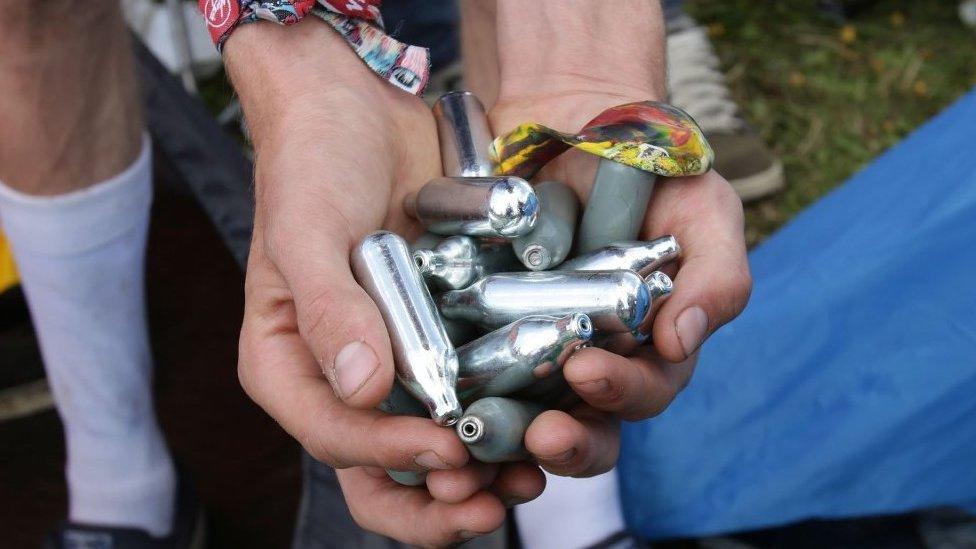Nitrous oxide: What is it and how dangerous is it?
- Published

The government is planning to make possession of nitrous oxide - also known as laughing gas - a criminal offence in England and Wales.
Known as NOS, its use as a recreational drug soared during the pandemic and it is presently one of the most-used drugs by 16 to 24-year-olds in the UK.
Announcing the proposal, Prime Minister Rishi Sunak said: "I, and almost everyone else, is just sick of having to deal with nitrous oxide canisters when they're walking through their communities. And it's not just about the littering, [but] it's about the damage that's being done by the people who are using it."
What is nitrous oxide?
Nitrous oxide is a colourless gas commonly used as an analgesic - a painkiller - in medicine and dentistry, and for producing whipped cream in cooking.
When mixed with oxygen, it is known as "gas and air" which is used in childbirth to help reduce the sensation of pain.
What does it do to the body?
Laughing gas, sold in metal canisters, is frequently used as a recreational drug. It is inhaled, often using a balloon.
The gas can make people relaxed, giggly, light-headed or dizzy.
It can also cause headaches and make some users anxious or paranoid; too much nitrous oxide can make a person faint or lose consciousness.
Intensive, frequent use of laughing gas can lead to vitamin B12 deficiency which can cause neurological damage, according to a government report, external quoting several scientific studies.
The most common early symptoms of neurological damage are tingling and numbness in the hands or feet.
Other early symptoms of neurological damage caused by laughing gas include "skin crawling, and later, staggering, uncoordinated walk[ing], lower limb weakness, muscles stiffening or tightening, overactive or overresponsive bodily reflexes such as twitching, bladder/bowel complaints of incontinence or retention, and sexual dysfunction", according to the report.
Is laughing gas a drug?
Nitrous oxide is not currently controlled by the Misuse of Drugs Act, which means it is not classified as a class A, B or C drug.
The government wants to change that. but has not yet said which classification laughing gas would come under.
It is already registered under the Psychoactive Substances Act, external, although that affects how it is sold, rather than its use.
Where can you buy it?
Under the terms of the Psychoactive Substances Act, producing, selling or importing laughing gas for human consumption is illegal if you know it is going to be misused for its psychoactive effects
At the moment, possession of nitrous oxide remains legal - unless it is with the intent to supply - but the government has announced its intention to change the law as part of a crackdown on anti-social behaviour.
Currently, it can be bought from various retailers as a propellant gas for whipped cream and other industrial purposes, but the law states retailers must take reasonable steps to make sure they are aware of the potential misuse of psychoactive substances.
Before any sale, retailers should consider, external the circumstances of the sale (such as the quantity sold or the time of day of the sale) and whether the customer is a repeat purchaser.
A retailer found to have recklessly sold nitrous oxide could face six months in prison or an unlimited fine.
As a result of Psychoactive Substances Act, there were, external:
152 convictions in 2017
107 convictions in 2018
52 convictions in 2019
Under the government's new rules there are expected to be tighter controls on retailers - to help prevent laughing gas being supplied for misuse. The government has announced it will run a consultation over the spring and summer to work out how to do this.
Is nitrous oxide dangerous?
Between 2001 and 2020, there were 56 registered deaths involving nitrous oxide in England and Wales - 45 of them since 2010, according to the government report.
However, that figure includes deaths which occurred in medical settings, so cannot all be ascribed to misuse.
Deaths occur due to secondary effects, rather than first-hand effects, of the gas.
The most common cause of death is suffocating from the lack of oxygen when the gas is used in confined spaces, for example in a car, or with a face mask or plastic bag over the head.
Prof David Nutt, from Imperial College London's department of medicine, says: "Scientific evidence suggests that there is around one death per year in the UK from around 1 million nitrous oxide users.
"A comparison with alcohol would be that around 28,000 deaths happen per year in around 40 million users of alcohol," he adds.